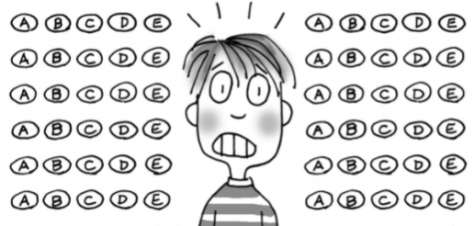Students in schools around the world don’t enjoy the idea of taking tests, but for some students, their anxiety gets in the way of performing well on a test.
What is Test Anxiety?
According to VeryWellMind, Test anxiety is a psychological condition in which people experience extreme distress and anxiety in testing situations. While many people experience some type of stress and anxiety before and during exams, test anxiety can impair learning and hurt good test performance.
Causes of Test Anxiety
Situational Causes:
- The pressure of timed tests.
- Intimidation of taking tests in a crowded classroom.
- Poor study skills or a lack of preparedness.
- A history of stress related to test-taking.
- Lack of understanding of the material.
- Previous poor test performance.
Mental Causes:
- Fear of poor grades.
- Fear of letting down others (parents, teachers).
- Placing too much emphasis on single tests and exams.
- High expectations of his/her own performance.
- Using grades as a reflection of self-worth.
- Poor self-esteem or negative self-talk.
How Does Test Anxiety Affect Students?
A student can have the skills and knowledge to do very well in test situations, but their excessive anxiety impairs their performance. The severity of test anxiety can vary from one person to another. Some students might feel like they have “butterflies” in their stomach and while others might find it difficult to concentrate on the exam. This excessive fear causes students to struggle to recall things that they have studied. A student can blank out the answers to questions to which they know what the answer is. A student might feel like all the information they spent time on studying can seem inaccessible in their mind. This inability to concentrate and recall information contributes to even more anxiety and stress, which only makes it much harder to focus attention on the test.

For some students, they don’t even realize that they’ve been struggling with test anxiety for a long time. “I first realized, that tests were making me anxious in middle school, when grades were actually very important. I realized that a test could either make or break my grade, and that stressed me out,” Freshman Ellen Owen said.
Some tests have a huge impact on student’s grades which can cause their anxiety to increase more. “In more important tests I will say my anxiety can get in the way because I have trouble focusing and have to read the question multiple times, which can slow me down, and then I have to rush on the rest of it so it isn’t to the best of my ability,” Sophomore Haley Dickinson said.
All students stress over tests, but test anxiety can cause major stress for students. “I typically do stress over tests because I know that it can go either of two ways, I surprisingly just remember the stuff on the test without studying and or I study for the test but forget everything on it from the anxiety of taking the test,” Sophomore Kaden McCandless said.
Symptoms of Test Anxiety
- Physical Symptoms: Headache, nausea, excessive sweating, shortness of breath, rapid heartbeat, lightheadedness, and feeling faint. Test anxiety can also cause panic attacks.
- Emotional Symptoms: Feelings of stress, fear, helplessness, and disappointment, negative thoughts (thinking about past poor performances, consequences of failure, feeling helpless), mind going blank, and racing thoughts.
- Behavioral/Cognitive Symptoms: Difficulty concentrating, comparing yourself to others, and procrastinating. Symptoms can also include fidgeting or outright avoidance of testing situations. In some cases, test anxiety can become so severe that students will drop out of school in order to avoid the source of their fear.

Tips to Help to Overcome Test Anxiety
- Avoid the “Perfectionist Trap”: Don’t expect to be perfect. When a student knows that they have done their best and worked hard is the only thing that matters, not the perfection.
- Stop All Negative Thoughts: If a student starts to have anxious thoughts, such as “I’m not good enough,” “I didn’t study hard enough,” or “I can’t do this,” they should disregard all those thoughts and replace them with positive thoughts like, “I can do this,” “I know the material,” and “I studied hard.”
- Make Sure to Get Enough Sleep the Night Before: Seven to nine hours of a good night’s sleep will help a student’s concentration and memory.
- Be prepared: That means talking to the teacher to get an idea of what is on the test and what to expect. Don’t wait until the night before to study, study for the test early until one feels comfortable with the material. Being prepared will boost a student’s confidence, which will help lower their test anxiety.
- Take Deep Breaths During the Test: Breathe in deeply through the nose and out through the mouth. Work through each question or problem one at a time, taking a deep breath in between each one as needed.
For people who struggle with test anxiety the best part about taking tests is when they finish it. When a student finishes their test they will feel a sense of relief, accomplishment, and satisfaction. They don’t have to feel like their heart is beating at a hundred miles an hour. They can finally relax and move on with their day know that they just accomplished a difficult task.
“After I take a test, I usually feel relieved that it is over, and that I don’t have to stress about those materials as much,” Owen said.











